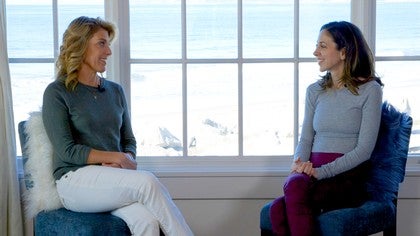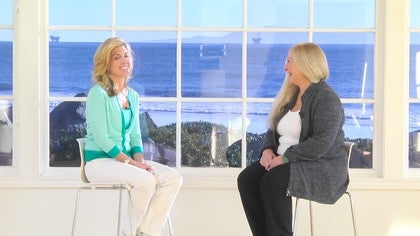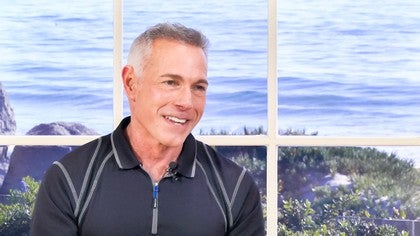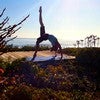Discussion #3452
Conversation on Fear
Description
About This Video
Transcript
Read Full Transcript
I am here in Santa Barbara and, um, mainly came to San rubber this trip to do a workshop on fear. And Christy Cooper and I were talking about how it'd be interesting if we had a conversation about fear from our perspectives, her as someone who had experienced a pretty significant injury that was an acute injury and me having, um, a medical condition that's more of a chronic condition and how that sort of plays into your fears. And Kristie was nice enough to, um, say I can ask her anything. So I will be asking her mainly about the concussion that she had. So thank you, Christie for you being accommodating. You're welcome. Is um, no, it's, it's a big subject. So, um, you might regret that one of the things that I have no filter so you will, you'll get some good answers perhaps actually. Okay, excellent. So, um, both pre concussion. Yeah. Um, what would you say you were like in terms of things you were afraid of?
Um, cause I think you've, you know, when we look at you, we see you out there doing cartwheels and we see you dancing and, and kind of living what I would consider kind of a big life where you really put yourself out there, which some people would be too afraid to do. Um, but how do you think you were kind of before like two years ago?
But then when all of a sudden there's more exposure than ever you thought. And I don't mean anything huge. I just mean more than I ever had
You know, it's, it's to get my message across and then, right. You know, making sure that they heard it and that, so it's like the fear of being misunderstood is always probably the undercurrent for me. So how many, um, plottings anytime videos have you shot at this point? Meaning personally? Personally, I think I just crossed the 200 mark. Okay. Do you
I'm like, I do these things that I know is strictly because I'm afraid and I'm very nervous to get again exposed even though it can be edited. Well, you know, that is funny. So we, we do edit of course. I mean if something goes wrong, we're not gonna force people to sit through it, but, um, color. Correct. And that's, that's really about it. I think you know that. And um, but what I say to myself is, I just want you to, I just want you use it like we've done that one time and actually we did use it, but I was sick and it sounded like it. So we pulled it, but we've never not used one. Um, but still I'll say that cause that's not the point. It's like, yeah, some days you're off and some days, but once you get going, it's usually absolutely fine. But it's, it is that sense of I got to do right by everybody in the room. I've got to do right by the people who do like my classes.
I got to do right by myself. I gotta do right by the whole organization. All of that. It just sort of, I feel it. It's silly. Probably,
So I kind of try. That's one of my tactics. Um, but obviously like most everyone who, um, has been following Claudia's anytime know that you had a very bad head injury, um, really, uh, out of the blue. So can you tell a little bit about how that happened? Um, for those people who don't know?
And that was on the last few minutes. And I, I think what I did, um, I mean forensically it's pretty obvious. I had been dancing, I had socks on that night cause I had kept the doors open. And um, I in the last moment I just jumped up like in a moment of Gui onto the trampoline and I right foot probably hit the trampoline slip, left foot, never hit. So my hip hit the room and my head hit the floor, the wood floor and I don't know how long I was out. I have some time code that suggests was about 15 minutes, but who knows, I was alone and um, and then I, I didn't do anything about it.
They can't find me with the furniture push and the dishes and this thing. I'm not kidding. When did you, when did you know that it was more than just a bump on your head? That it was significant and things were changed for you?
And, um, as the weeks went on, um, hearing and vision got worse. And so I got, I finally got a CT scan three weeks later, but I bye bye. I did talk to people in doctors prior to that and um, the fact that I made it through the first two days was like, you made it. There's now it's just recovery. Right. So I knew then and I was shocked that it took, it literally took probably til if that was November, July before I really started to feel normal again. [inaudible]
So that was the first [inaudible] I'm remembering it only as you say it, but yeah, that was my first time. Not that I had moved. No, no, no. But then she had, but I was willing to go on camera. Yes. Um, so what was scary? Okay. Can you explain what was scary about that? Why was scary? Yes.
It was the first, I remember it was the first class of 2017. Yeah,
And um, we worked it out where, uh, uh, you can't see my face and I just cried my way through the end of it and I was confused and it was awful and ran out of the room when it was over and you know, and then it's a short circuiting and then there's a pain that follows that. So it's not just I'm embarrassed, it's, I've over done it. I didn't even know it was coming. And then next four days in bed
I th I mean, I don't know what that means chemically. I also know the chemicals were off still, um, just from the impact. And uh, the fear was being in the world, not as the person I looked like anymore and having to act like I was and not having the skills to do it and what that was gonna produce all around me. I mean, lots of people close to me in this business and friends and family suffered because I seemed normal. One Minute and then the next minute I'm, I'm really like losing it. I say losing it. But I mean it could be angry, it could be sobbing, it could be, it's usually angry in the beginning. So it's a fear of not knowing what was going to happen in any given moment.
Like if that is the thing you do and then you can't really do it. I mean there's, now I'm thinking of other fuse, but if, you know, I could move, it didn't feel great and I could see when I was talking that was hard or thinking right hard, I could move. But you still have to talk and think if you're going to teach. Right. I wasn't doing that for a long time. Yeah. A long, long time. Um, but, but what, early on I won. I had to move because of this identity thing. Like who am I? If I'm not, I'm not, might as well not be here at all. That's a strong belief.
That's never changed. That, um, movement is life. I know that's sounds Cliche, but if you're not moving, you're dead right. You might as well be in my mind. And so I would like feel guilty for trying to dance. Cause like what if I got hurt again? Talk about, you know, I'd be mortified. And she really is offering, you know, she, she went danced again, you know, but that was the only thing that made me feel normal that, that at first, and it was subtle. I wasn't jumping up on the rebounder, but, um, yeah, I think that's absolutely true. I don't understand it. Like I said, chemically or scientifically, but I had, I had to almost sneak it and not telling him once I put on the helmet just in case and I was like, that's insane. I mean, I lasted like 30 seconds, but I was like, okay, this is like a South Park episode. [inaudible] say it's like you're like channeling daft punk.
It's like you're just trying to be like that. It didn't work. It was bison plus staffed one that I was thinking in my mind. So yeah, it was not nice. I was like, I just can't do that. Well, now that you are, I mean, not 100%, but way more back to Christie than you were before. Um, you told me a story about a freak out that you had on a hike. Can you tell me a little bit about what happened? Yes. And then, and then I can dissect it for you as to what was going on. Yeah, once I about, you know, um, this was not that long ago. It was a work retreat with John and Ted and I, and we were, you know, I felt good, you know, I feel good. I, I have, I still have things that come up and I know I've over done it, but we went on this great hike up in Arrowhead and, um, at the pinnacle, it's actually called pinnacles.
Um, it's boulder mount. And John had gotten ahead of us and Ted and I were just going and we, we chose a route that wasn't the route, although may might as well have been, there really wasn't one. So we didn't, when we start to go up and, and I, I really, um, on this boulder and it's only boulders around me and I, it's a big step for me. And I just froze, but I'm now and not like almost a full split from me. And, and I, and I, I just, I start to feel that thing when I would say I'd fall apart where I know I've over done it. I didn't know it was coming. And, um, I, I can't move. I'm going to cry. I can't cry. I've edited and John, Oh my God, you know, it was all that stuff flooding into it. And um, I tried as I could, you can't, I had to do something cause there was no way to go backwards at that point. So I'm half up and half paralyzed and then my foot got caught in the, in the crack and I, and I'm thinking this is it and I am so now the confidence factor is so low, eight, nine months later for what you, your capabilities are, whether it's speech, physical capabilities, um, then then you add in the judgment you have for not being as fit as you used to be. And how could I not know I couldn't do this. And um, and Ted had to help me out. I mean literally had to help me. I mean, it was not safe for him either. And, and he did and it was fine.
It was actually really good in the end. But yeah, that, that can still happen. The confidence is gone. And, and you know, that probably sent me back a little bit too, but,
So it's the first reactor and it tends to react really big. And then if you're not paying attention to it, it will pump so many chemicals into you, like a screaming toddler that's like, pay attention to me, pay attention to me, pay attention to me. And, um, someone had asked me if you have a student for who you're teaching, who starts to freak out during an exercise, do you push them through the exercise? And my thinking is no. You take them back out of the situation that's freaking them out. Yeah. Give them basically, which we'll talk about in the workshop. You basically try to pump them full of hormones that are going to, and neurotransmitters that are going to support them doing something more scary and then maybe re-introduce it in a way that would feel safer for them.
But once your body is in like full freak out mode, you can't really do anything about it. You just have to kind of remove yourself from the situation that you're freaking out, which is, you know, always good if you have someone there. If your foot stuck, it was totally imperative. I mean I d I also had to include rationale cause you know, there's that moment where you go get away, get away, get away. But I knew well something's gotta happen here was like, okay, you could come down here and grab my foot and push me up.
Please you don't have softball. And it is like both, you know, an assault on your, um, your primitive brain freaking out. But then it's also such an assault on your self esteem and your self esteem is also in your primitive brain. So it's like, I'm going to be judged, people are going to think I'm not nearly as awesome or whatever. And then it's just kind of a cocktail of, yeah, no one could judge me more than me in that. That's true of anything. No one will judge you harder than you'll judge yourself. Like I know I'm, and people think this is really weird. I will watch the plays anytime videos, I'm in one time and I will never watch them again. Really? No, because I'm like, I just look at them and I'm like, ugh. Or like I can't believe I said that or whatever. I don't know.
Like I looked bad or my form was bad and I will never ever watch them again. Yeah. I have to go. Well the lighting is good. Oh, have a good shot. That's a good angle. Yeah. Good job, Harry. Good job, Stephanie. Um, but then what I, what I've taken to doing this is a good tip is you, he looked through the form and if you get like there's a critical mass of okay, enough people said Yay, it's all right then I'll go, all right, I'll look. Otherwise I'm like, I remember that day. I'm not looking at that one anyway. So do you have questions?
Well you're talking to me about an acute injury and um, what about a chronic one? You know, how, how do you accommodate that? You know, I, I think about, I don't know a whole lot about ms, but if you, I think it's not so different in terms of if you get over fatigued, um, and now you're traveling cross country to teach on camera the one time of the year and everything. That alone could psychologically push you into a place of, I don't know if it's fear or if it's fatigue or fatigue. I don't know what happens for you. It's really interesting cause I've had ms for the majority of my adult life, so I'm very accustomed to it. Although I've had a really bad year. Like, this is one of my worst ms years that I've ever had.
And it was like a playing around with medication that we went to long before giving me the medication that I normally take. And so I'm actually, I was in a really bad flareup, which I'm still on the tail ends of so it's actually kind of hard for me to walk right now, which is more of, you know, you really realize like how much of a pain in the acid is if you can't get around easily, you know. So it's like for me, um, the things that are more kind of freak out things for me right now or like okay, well going to place and how far am I going to have to walk. That's like a lot of this stuff is like, okay, like how far am I going to have to walk to get from point a to point B. Like I flew into f through Phoenix and the Phoenix airport is really stupid because terminal a is where we landed and I was in terminal B and B as the furthest away from a, it doesn't make any sense at all. And so it was like the woman, um, when I was, because my, I had missed my flight and she was like, okay, it's in Terminal B. And she's like, it's just like a 20 minute walk. And I'm like, okay, for you it's just like a 20 minute walk. And I'm thinking like, it's like a 20 minute walk. And I know they don't have any, they have like the people mover things but they don't have like, you know, a train or something. And I was just like 20 minutes like, and luckily I didn't have to do it fast because like walking fast, not working for me right now. Um, but I mean I'm not as freaked out.
I've had moments where I'm just like, is this it? Yeah. Is it not going to get better? Like is it cause it's always gotten better before? And I'm like, okay, my walking has definitely gotten worse over the years. And I'm like, okay, now it's worse than it was. So I'm like, and is this the new normal? Am I going to have to get used to it? Right. Which is, but then I had like a couple of days where it was like, fine. And walking was fine, but only like a couple of days and it came back to this.
But I'm like, oh, but for a couple of days it was fine. So you're having to rationalize the thing you're afraid of. Yeah. And so to me that's my number one fear, but it's like, it's not the fear that I like to live in. So one of the reasons I was really interested in doing this workshop is, um, I had this kind of innate feeling and I wanted to basically know if it was true that if you trained fear, like if that was part of your workout, like, can you make fear part of your workout? Do you innately get better at dealing with tough situations?
Because you've just proven that you can do other things. So I started working with a trainer, um, about a year ago cause I was like, I want to be able to do a press handstand. And you know, that's totally reasonable decision to make when you're in your forties to just decide that you, something you've never done in your life you shouldn't be doing now. And it's also the thing that is movement wise, something that really freaked you out. And just seeing though that you chose your upper body. I did choose my upper body because my lower body is like non-cooperative.
So I did choose upper body, but it's also, I do have a fear of falling because I have the same thing where I'm like, I'm really afraid of hurting myself because like I always think about if I'm hurt then I can do all this stuff that makes me more capable living with Ms. In which case then how bad would the Ms. Guy. So I'm very like, I don't want to get hurt. I don't want you to hurt. I don't want to hit her. So, um, I just started working with that and like, I know just from life, my mom died about a year and a half after I was diagnosed with Ms. And, um, I felt like, honestly that helped me deal with that loss cause I had practiced dealing with losses in a way, you know, that like life had already punched me a couple of times. And so when it punched me again, it was like, I sort of have, I'm not a Buddhist, my husband's a Buddhist, but I sort of have a Buddhist, like everyone suffers. Life is unfair kind of mentality about things.
And I think that was useful in that situation. Um, but like scientifically, if you do exercise fearful things, you actually do almost get stronger and see, yeah, you're not resilient. Yeah. It's like you, um, they always say, you know, there's that saying like, God doesn't give you more in life than you can handle and you're just like, why do you think I can handle so much? And I think sometimes like, people who have handled a lot are good at handling things. You know, it's like, well yeah, I think I would love to know the science behind that. Cause I do think you, um, you know, things are different cause I'm not, so I'm not so afraid of exposure now. Now I'm like, yeah, I can't do that or I'm going to try to do that. But it doesn't, I don't feel that pressure like I did before. Not because, well, I don't know why, but I don't, I don't feel like even if I don't get all the lists done, like they used to be some sort of stress and I know if it was fight or flight or freeze, but it was now it's, it's just not as, and I don't know to, if you, once you get older, not that we're older, we're still, you know, obviously not. But, um, I think I wonder sometimes once you get older, do you just, you know, have less F's to give about stuff. You know, you're just like, well, whatever. It's like, yeah. But the flip of that, like when, when I talk about I don't want to get hurt and that that is so obvious to me and that I mean I look three years ago, I'm at the tip of Scotland, you know, hanging out with those pictures and I'm like, I was always safe. I was, I was, I mean I could fall but not as bad as they looked. Um, it was all on the angle. But, um, I and I would always say so too, cause I didn't want people thinking that, but they're cool. But that was only three years ago and now, you know, I, I don't, I think that when you get so fearful of what could happen, you, oh, that's what ages you too. So it's a fine line for me. I'm, I'm still, I'm on the edge of, if I don't break through a little bit soon, um, I might as well just sit down, you know, you know, cause you, I think it just gradually increases this sort of sedentary mindset. I wonder sometimes cause people are like, I shared with Dr once, he's like, oh, it's weird that you are applaud. He's teacher who got Ms. And I'm like, well that's not weird, but it's actually not weird at all.
But it's like all but it might be a little bit weird that I became a place to teach. Ironic. I guess. I, it's like I actually became a Plata teacher after I was diagnosed with Ms. So it's like, I feel like I've, I make choices sometimes as almost like a screw you ms. I'm gonna like make my life have to fit into my terms, not it's terms, you know, so it's like, so I have a house with stairs. I just got a new puppy that's very, you're leaving early to go see him trying to figure out how to get home early tomorrow cause we just got this puppy and um, it's a kind of dog that needs to be walked a lot. And I purposely was like, I want a puppy. I want something that makes me get out. Even if I have, like, I have a walking brace on now and like, even if I have to walk with a walking brace, I want something that's going to get me out there. That's exactly what I'm doing to, I'm trying to do like, can I have a dog, can I have a dog? Can I rent where I live? So no, but um, for almost that same reason, partly companionship, but also I kind gotta get out more. Right. And that's why I'm just like, I've gotten to, I've become, I've gotten out, I have a senior dog as well and you know, she's gotten lazier and I've gotten lazier because she's lazier.
And I find that I'm making more excuses to not walk because it's hard. And so I'm just like, oh, I don't really have to walk there or it's really cold. I could take an Uber cause I can walk to my studio from my house. And, um, and I'm just like, you know, I have this new little guy and he's going to need me to like take him for walks or else he's going to destroy my house. So basically like it's my house or the dog. So I feel like it sounds like you want to to, yeah, you know, I did it because you know, hey, I love animals, but I was like, this will make me do it because I'll do it because I love him more than I'm trying to make my life easy or easier or whatever. And it's like, you know, I walk with a walking brace and a lot of times people are like, Oh did you break your ankle or whatever. And I'm like, I really don't want to like go through my life story with you, random person on the street. So a lot of times I'm just like, I'll just make up something cause I don't really want to say, oh I have ms and then they want to talk about it. Cause I'm like, I don't know you, I don't really want to talk to you about my life. Um, but then sometimes I will, you know, it just kind of depends. But I'm like, but I really rather talk about my dog, you know, noticed what we really wanted to do with the workshop is to kind of look at fear from the different angles that we experienced it as teachers.
So obviously we have our own fears because who doesn't? Um, but we also, we working with people with chronic and acute injuries and there's actually kind of a difference in how you would work with that. Um, that chronic injuries sometimes can be worse than acute injuries can sometimes be worse than we can figure out why that is. But when you have a fearful student, how can you support them? Yep. You know, what can you do to really help them through it so that they can, I mean, there's nothing, I
Just to have someone watch me move knowing I burst into tears every time cause it feels so good. And, um, I prepped her and it's like, you're going to be okay if I cry. Right. And she's like, anyway, she handled me perfectly, that I walked out. I did it, you know, I didn't walk out crying. I walked out after crying and, and it was awesome for me. It was like I did it. I had someone watch me go through that process and it was just pure witness that helped me in that case. So I think fear can show up in all sorts of ways and I'm really excited to hear other ways to handle it. Cause I, I would, I doubted that she could cause, um, like a loose cannon in some ways. And she did. So I'm excited to hear more tactics in the workshop. Yeah, I'm excited. I think it's gonna be, um, it was probably the most fascinating research that I've done. Um, so I would just be telling people I, and I'm like, oh, did you know this?
Did you knew this? Did you know? So it's, I think it's going to be really an interesting one that everyone can relate to because who doesn't have fears and who doesn't, right. When the freak out students, well, right, or who doesn't freak out. Right. And you had written the emails saying, I have this idea. I keep thinking about creating this fear workshop. And that was when I wasn't even supposed to be on the computer. And I was like, yes, I love it. I love it. I love it. And here we are.
So thank you very much. Yes, thank you.
The Teacher's Corner: Discussions
Comments
You need to be a subscriber to post a comment.
Please Log In or Create an Account to start your free trial.





















